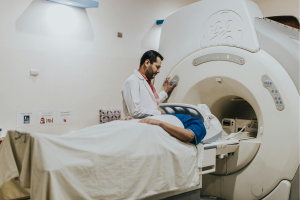Repetitive Transcranial Magnetic Stimulation (rTMS)

Repetitive Transcranial Magnetic Stimulation (rTMS): A Non-Invasive Solution for Mental Health
At Manoshanti Neuropsychiatry Clinic, we prioritize innovative, evidence-based treatments that offer hope to individuals battling mental health conditions. One such cutting-edge therapy is Repetitive Transcranial Magnetic Stimulation (rTMS). This non-invasive, FDA-approved treatment has transformed the way we address treatment-resistant mental health disorders, providing relief without the need for medication or invasive procedures.
What is rTMS?
Repetitive Transcranial Magnetic Stimulation (rTMS) is a non-invasive procedure that uses magnetic fields to stimulate specific areas of the brain associated with mood regulation and mental health. It is primarily used for individuals who have not responded adequately to traditional treatments like medications or psychotherapy.
Key conditions treated with rTMS include:
- Depression: Particularly major depressive disorder (MDD), especially in treatment-resistant cases.
- Obsessive-Compulsive Disorder (OCD): To alleviate intrusive thoughts and compulsive behaviors.
- Anxiety Disorders: Including generalized anxiety disorder (GAD) and post-traumatic stress disorder (PTSD).
- Chronic Pain: Certain types of pain syndromes may also benefit from rTMS.
How Does rTMS Work?
- Magnetic Stimulation: A device generates magnetic pulses, which are delivered to specific areas of the brain, typically the prefrontal cortex, known to play a crucial role in mood regulation.
- Neuroplasticity: These pulses stimulate neurons, enhancing brain activity and promoting neuroplasticity (the brain’s ability to reorganize itself).
- Improved Connectivity: Over time, rTMS helps restore the balance of brain circuits involved in depression, anxiety, and other conditions.
What to Expect During rTMS Treatment
- Initial Consultation:
- A detailed assessment is conducted to determine if rTMS is suitable for you.
- A personalized treatment plan is developed based on your condition and symptoms.
- Treatment Sessions:
- You will sit comfortably in a chair during the session.
- A magnetic coil is positioned on your head, targeting the specific brain region.
- The device delivers painless magnetic pulses, which may feel like tapping on your scalp.
- Each session typically lasts 20–40 minutes.
- Frequency and Duration:
- rTMS treatment usually requires multiple sessions, typically 5 days a week for 4–6 weeks, depending on your condition.
- Post-Treatment:
- rTMS requires no anesthesia or downtime. You can resume normal activities immediately after each session.
Advantages of rTMS
- Non-Invasive: No surgery, needles, or medication are involved.
- Minimal Side Effects: rTMS is well-tolerated, with mild side effects such as scalp discomfort or headache, which usually resolve quickly.
- No Systemic Effects: Unlike medications, rTMS does not cause drowsiness, weight gain, or other systemic side effects.
- Effective for Treatment-Resistant Cases: Offers hope for individuals who have not responded to medications or therapy.
- Improves Quality of Life: Patients often report significant improvements in mood, energy levels, and overall functioning.
Is rTMS Safe?
Yes, rTMS is a safe and FDA-approved treatment for various mental health conditions. It is performed under strict medical supervision by trained professionals. Advanced technology ensures precise targeting of the brain region, minimizing any risks.
Potential Side Effects:
While rTMS is generally safe, a few mild side effects may occur, such as:
- Scalp discomfort during or after treatment.
- Mild headache, which can be managed with over-the-counter pain relievers.
- Rarely, slight twitching or muscle spasms.
Seizures are an extremely rare side effect, occurring in less than 0.1% of cases.
Who Can Benefit from rTMS?
rTMS is ideal for individuals who:
- Have not achieved adequate relief from traditional treatments like antidepressants or psychotherapy.
- Cannot tolerate medication side effects.
- Are seeking non-invasive alternatives for their mental health concerns.
Myths and Facts About rTMS
- Myth: rTMS is painful.
Fact: rTMS is non-invasive and painless, with only mild scalp sensations during treatment. - Myth: rTMS causes memory loss.
Fact: Unlike ECT, rTMS does not cause memory loss or cognitive impairment. - Myth: rTMS is experimental.
Fact: rTMS is an FDA-approved, evidence-based treatment with a strong track record of success.
Why Choose Manoshanti Neuropsychiatry Clinic for rTMS?
At Manoshanti Neuropsychiatry Clinic, we are committed to providing compassionate care using the latest advancements in mental health treatments. Our rTMS services are delivered by experienced professionals in a comfortable and supportive environment. We tailor each treatment plan to suit your unique needs, ensuring the best possible outcomes.
Take the First Step Towards Recovery
If you or a loved one is struggling with depression, anxiety, or another mental health condition, Repetitive Transcranial Magnetic Stimulation (rTMS) may be the solution you’ve been searching for. Contact Manoshanti Neuropsychiatry Clinic today to learn more or schedule a consultation.
